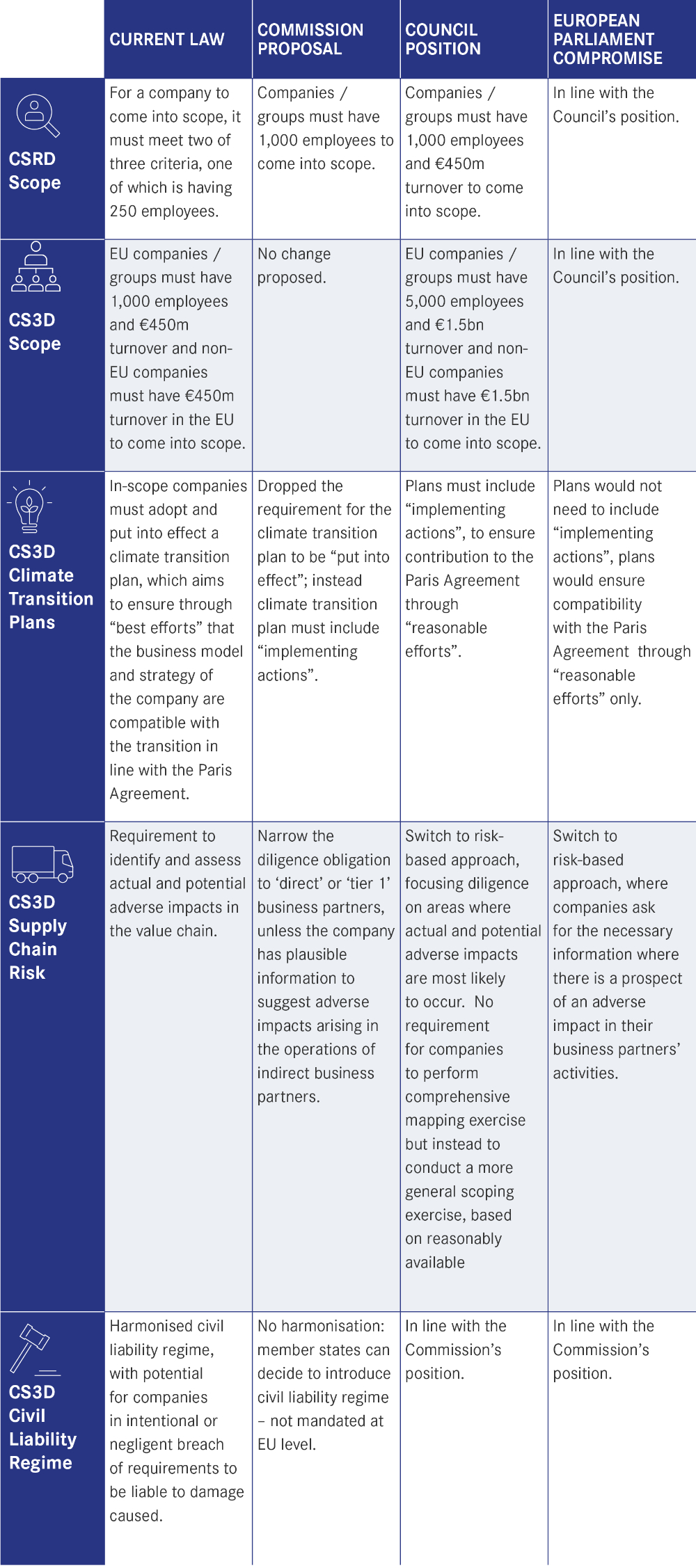- within Corporate/Commercial Law topic(s)
- with readers working within the Business & Consumer Services industries
- within Media, Telecoms, IT, Entertainment, Food, Drugs, Healthcare, Life Sciences and Antitrust/Competition Law topic(s)
MEPs Align on Scale-back to Sustainability Reporting and Due Diligence Rules
On Monday 13 October, the European Parliament's influential Legal Affairs (JURI) Committee ("JURI Committee") held a key vote on the proposals to amend the Corporate Sustainability Reporting Directive ("CSRD") and the Corporate Sustainability Due Diligence Directive ("CS3D"). The position adopted by the MEPs would see a further scale-back of the EU's sustainability rules. In this article, we outline the changes proposed and the key takeaways for businesses.
Background: The First Omnibus Simplification Package
Following the launch of the EU Green Deal in 2019, the EU introduced laws seeking to address climate and other sustainability issues, including the Corporate Sustainability Reporting Directive (the "CSRD") and the Corporate Sustainability Due Diligence Directive (the "CS3D").
The CSRD introduced a new requirement for many companies to engage in mandatory sustainability reporting, by including extensive sustainability related disclosures in a dedicated section of their annual reports. While the CSRD requires mandatory reporting, the CS3D will require affected companies to (among other things) integrate due diligence into their policies and risk management systems and to prevent, mitigate and remediate adverse human rights and environmental impacts.
In light of concerns that sustainability rules are negatively affecting EU companies' competitiveness, in February 2025 the European Commission announced the first "omnibus simplification package", a set of legislative proposals designed to simplify certain sustainability laws, including CSRD and CS3D (see our update here). In June 2025, the Council of the European Union agreed its negotiating position on the proposals (see our update here). The Council largely agreed with the Commission's proposals but proposed even an more extensive scaling back of, in particular, the scope of application of the CSRD.
All eyes then turned to the European Parliament, where negotiations on the proposals has been particularly controversial, as pro-European and right-wing political groups of MEPs disagreed over the extent of the changes. The European Parliament's lead negotiator, Jorgen Warborn, had proposed two possible alternatives: one favoured by right-wing MEPs; and a second, which was designed to align the European People's Party, Socialists and Democrats, Renew and Greens. It has been reported that a compromise was reached on the second alternative, in light of concerns among centrist and left-wing parties about the possibility of the more right-wing alternative being adopted.
Next Steps
The JURI Committee's proposal is due to be voted on by the European Parliament next week. If the European Parliament approves of the JURI Committee's position, then trilogue negotiations between the European Commission, the Council of Europe and the European Parliament will begin on the final text of the legislation (possibly as beginning as soon as 24 October).
The Proposals
As the omnibus simplification package enters trilogue, each EU institution's views on certain key changes proposed to the CSRD and CS3D can generally be summarised as follows:

Key Takeaways for Businesses
The EU's attempts to simplify its sustainability and due diligence rules have been very controversial, but this latest vote by the JURI Committee indicates that compromise and agreement on the simplified rules is likely. Many European businesses will welcome the further cut-backs to the scope of the CSRD and the CS3D, with some estimates indicating that the CSRD is likely to apply to 90% fewer companies and the CS3D to 70% fewer companies.
Businesses will also welcome the certainty that finalising the new rules will bring. Many companies had slowed down their work on the CSRD in light of the omnibus negotiations. For companies likely to continue to be in-scope for the EU's rules, this week's vote means businesses can get back to planning in earnest for the reporting and due diligence regimes.
The content of this article is intended to provide a general guide to the subject matter. Specialist advice should be sought about your specific circumstances.




